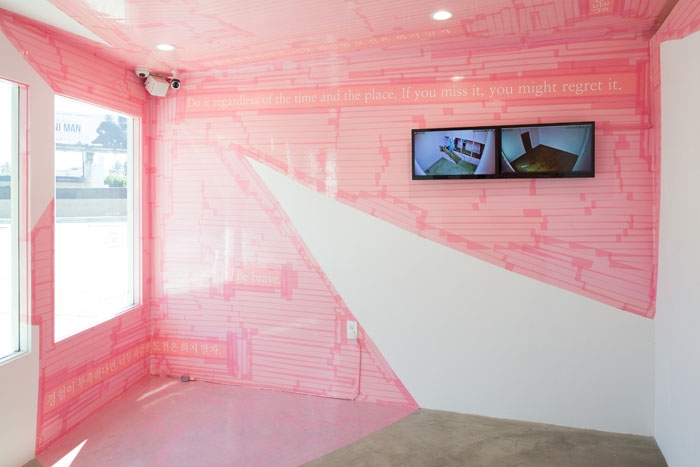A masturbatory moment is literally and symbolically a moment stolen for oneself, staged within what one might call a private exclusion zone, adjacent to the daily grind and away from the prying eyes of those who enforce social control. The political implications of this pilfered time – borrowed but never returned, and snagged for myriad reasons – are Inhwan Oh’s focus in this exhibition.
Jointly presented by Los Angeles galleries Commonwealth and Council and Baik Art, the exhibition is a two-for-one affair. In both galleries, CCTV cameras loom, monitors glow and stripes of pink tape ladder up walls and across ceilings in broad, irregular shapes.
The dominant tape designs are a work titled Reciprocal Viewing System (2017), and despite a sense of play suggested by the cotton-candy hue, the work is an exercise in paranoid self-awareness. The pink areas are where the cameras cannot see (blindspots created by the galleries’ architectures); the live-feed monitors show where they do.
One monitor in each gallery displays video footage of the gallery in which it is installed. The surrounding pink is not visible on the screen, and viewers respond to this curiosity by teetering back and forth along the boundary between the surveilled and the unseen, between the pink and the plain, watching themselves slip in and out of sight. Another monitor displays footage from the gallery across town. An occasional figure or bemused face floating across the screen is a reminder that a second camera installed above is always transmitting from one to the other sister venue, and that there is also here. The lesson: never get too comfortable.
Reciprocal Viewing System is a model for demonstrating, in the controlled environment of an art gallery, the psychological and behavioural effects of surveillance in pro-panoptic societies, and it addresses Oh’s insistence that, to quote his website, the ‘cultural blindspot is not an ideological conception, but a reality of the ordinary life’. Interviews conducted in another videowork, My Blind Spot – Interview (2014–15), drive this point home. Discharged South Korean soldiers recall the haunts in which they found provisional escape from their demanding military lifestyle and where they also, of course, masturbated. Situation rooms, command posts, closets and rooftops were but a few of their ‘perfect spots’.
One interviewee portrays the hunt for private spaces as though it were a thrilling game, hinting that the clandestine pursuit was itself often erotic. His sentiments parallel those expressed by gay men to whom cruising for sex is as much about exploring secretive forests, bathhouses or public toilets as it is about the encounters that their explorations yield.
Within cultures where views on sex, in particular homosexuality, are conservative – like they are in Korea – and where gender and sexuality are factors in discrimination – like they are in most places – blindspots such as cruising locales are quintessential sites of pleasure and resistance. Thus, My Blind Spot – Interview celebrates finding ways to subvert the authoritarian gaze that are compatible with, if not explicitly linked to, queer sexual politics, and it offers an example wherein blindspots (to paraphrase Judith Butler) make lives liveable.
The most striking aspect of My Blind Spot – Interview is the attention granted the descriptions of the soldiers’ pathways to their hideouts. That each man recalls the route in perfect detail is evidence that their blindspots were crucial to their wellbeing. Oh returns to these descriptions in other works such as On My Way to Blind Spots – Los Angeles (2019), a video playing from a monitor mounted to the ceiling of Commonwealth and Council, in which he follows the soldiers’ spoken directions while walking through an entirely different urban context.
In so doing, he broadens the cultural specificity of his project and indicates, obliquely but with confidence, that blindspots can be found anywhere, at any time.
Inhwan Oh: My Own Blind Spots at Commonwealth and Council & Baik Art, Los Angeles, 21 September – 2 November
From the Winter 2019 issue of ArtReview Asia
